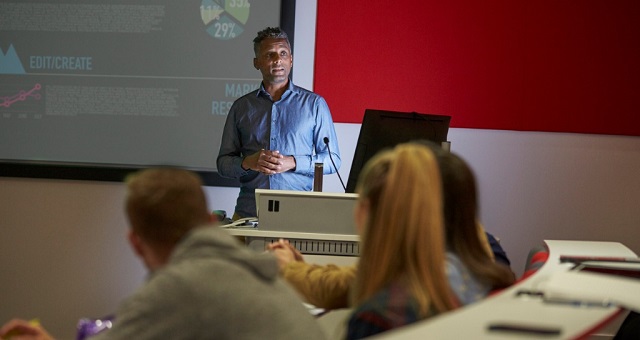The 5 Most Helpful Experiences for Moving from Faculty to Department Chair
Inadequate preparation, unrealistic expectations, and increased workload can be overwhelming for faculty members making the transition to department chair. Brenda Coppard, chair of occupational therapy at Creighton University, found this transition "just a little mind boggling" and decided to focus her research on it.
How to Create a Values-Driven Department
When Jeffrey Yergler became chair of the undergraduate management department at Golden Gate University, one of his priorities was to establish a values-driven department that emphasized improving faculty members’ well-being, performance, and sense of community within the management discipline.
Dealing with Disruptive Students
Most professors will have to deal with classroom disruptions at some point, from the relatively minor—students who show up for class late or who talk excessively—to the more serious—disrespectful, uncivil, or threatening student behavior. It's the role of the department chair to create a culture that helps prevent and deal...
The Perception Problem
Whose problem is it when there is a perception that the performance of a faculty or staff member has not been satisfactory? Consider, for instance, the following scenario. A chairperson is conducting an annual performance appraisal of a faculty member and says, “Your teaching seems to have been quite good this year,...
Financial Leadership from a Medieval Point of View
Universities can be subtle keepers of tradition. For instance, one of the first university endowments was created from feelings of being "unjustly vexed" and "enormously damnified." It was in 1260 that John Balliol apparently caused these ill feelings by somehow offending the lord of an English castle. To make amends,...
Rethinking Councils of Chairs
Over the last two decades there have been occasional conference presentations and articles in the higher education literature about collectives of academic department chairs that meet to discuss a variety of topics. These groups are not the same as a chairs’ council that is convened on a regular basis by...
Using Appreciative Inquiry to Facilitate Positive Change
As leaders we are expected to lead and manage change. A core success in that endeavor is to foster, create, and lead highly collaborative teams. A powerful way to achieve this is through appreciative inquiry. It’s a process I use with groups of all kinds. In this article, I will...
Congratulations—You Are a Leader! Now What?
Whether you are new to the school or moving into a position of leadership with more responsibility in your current department, there are some things to keep in mind for a smooth transition. In either situation, the work of a leader is not easy. Shifting from being a member of...
Bottom-Line Leadership
A friend of mine posed a question that I’ve been grappling with: “Why are so many college and university presidents so … bad?” The question caught me off guard since many of the college presidents I meet are hardworking, creative, dedicated leaders. But I knew exactly what he meant. Increasingly,...
Developing Formal and Informal Faculty Leaders
Leadership is not restricted to those in formal leadership positions. Rather, all faculty members in one way or another fill leadership roles and may eventually become formal leaders. Therefore, it’s important for them to develop their leadership abilities. In an interview with Academic Leader, Mariangela Maguire, associate professor of communication and...













